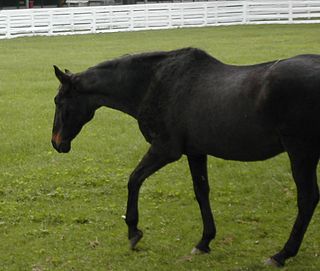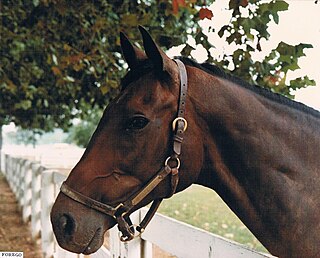Related Research Articles

John Henry was an American champion Thoroughbred racehorse. He was sired by Ole Bob Bowers out of Once Double. John Henry had 39 wins with $6,591,860 in earnings, was twice voted the Eclipse Award for Horse of the Year, and was listed as #23 on Blood Horse magazine's Top 100 U.S. Racehorses of the 20th Century.

Belmont Park is a thoroughbred horse racetrack in Elmont, New York, just east of New York City limits best known for hosting the Belmont Stakes, the final leg of the American Triple Crown. It was opened on May 4, 1905, and is one of the best well known racetracks in the United States. The original structure was demolished in 1963, and a second facility opened in 1968. The second structure was demolished in 2023, and a third version of Belmont Park is expected to open in 2026.

Saratoga Race Course is a Thoroughbred horse racing track located on Union Avenue in Saratoga Springs, New York, United States. Opened in 1863, it is often considered to be the oldest major sporting venue of any kind in the U.S. It is the fourth oldest racetrack after Pleasanton Fairgrounds Racetrack (1858), Freehold Raceway (1854) and Fair Grounds Race Course (1852).

Charles Edward Whittingham was an American Thoroughbred race horse trainer who is one of the most acclaimed trainers in U.S. racing history.
The Suburban Stakes is an American Grade II Thoroughbred horse race run annually at Belmont Park in Elmont, New York. Open to horses age three and older, it is now run at the 1+1⁄4 mile distance on dirt for a $350,000 purse.
The Woodward Stakes is an American Grade Il stakes race and is one of the premier races for older thoroughbred horses in the United States. It is named for prominent racehorse owner William Woodward.
The Forego Stakes is a Grade I American Thoroughbred horse race for horses four years old and older over the distance of seven furlongs on the dirt, scheduled annually in August at Saratoga Race Course in Saratoga Springs, New York. The event currently carries a purse of $500,000.

The Brooklyn Stakes is an American Thoroughbred horse race run annually in early June at Belmont Park in Elmont, New York, on Long Island. It currently is a Grade II event open to four-year-olds and up willing to race one and one-half miles on dirt. It was a Grade 1 race prior to 1993.
The Belmont Derby is an American Grade I stakes race for three-year-old Thoroughbred race horse run over a distance of 1+1⁄4 miles on the turf at Belmont Park in July. The purse for the 2023 race is US$750,000.
The New York Stakes is a Grade I American thoroughbred horse race for fillies and mares aged four-years-old and older run over a distance of one and one-quarter miles on the turf scheduled annually in early June at Belmont Park in Elmont, New York. The current purse is $600,000.

Forego was an American Thoroughbred racehorse that won eight Eclipse Awards including Horse of the Year, Champion Handicap Horse and Champion Sprinter.
Harry Allen Jerkens was an American thoroughbred race horse Hall of Fame trainer.
Donald R. Pierce is a retired U.S. Racing Hall of Fame jockey in thoroughbred horse racing.
Ancient Title was an American Thoroughbred Hall of Fame racehorse.

Wajima was an American Champion Thoroughbred racehorse.
Big Spruce (1969–2001) was an American Thoroughbred racehorse. He was an outstanding middle to longer distance runner on both dirt and grass called "one of North America's leading runners in the early 1970s" by the Thoroughbred Times.
Prince John was an American Thoroughbred racehorse called "one of the greatest broodmare sires of all time" by Bloodhorse magazine. Bred in Kentucky, he was sired by Princequillo, a two-time leading sire in North America and a nine-time leading broodmare sire. He was out of the mare Not Afraid, a daughter of 1943 U.S. Triple Crown winner and Hall of Fame inductee Count Fleet. Prince John was a full brother to Brave Lad.
Groovy (1983–2006) was an American Thoroughbred Champion sprint racehorse known for his love of jelly donuts. He is the only horse to break the 130 Beyer Speed Figure, accomplishing that milestone in his first two starts of 1987. In the Roseben Handicap at Belmont Racetrack, he earned a 131 rating, which he followed up with a 134 in the True North Handicap.
Caucasus was an American-bred Thoroughbred racehorse and sire who won major races on both sides of the Atlantic. As a young horse he was sent to race in Ireland where he won four of his five races as a three-year-old in 1975 including the Ulster Derby and Irish St. Leger. He then returned to America where he had considerable success in the next two years, winning five races including the Sunset Handicap, Manhattan Handicap, Arcadia Handicap and San Luis Rey Handicap. He had some success as a breeding stallion.
Jerome C. "Jerry" Meyer was a Canadian national champion trainer and Hall of Fame inductee in Thoroughbred racing.
References
- ↑ "A roundup of the sports information of the week - Horse Racing". Sports Illustrated (vault). 1970-09-21. Retrieved 2020-12-31.
- ↑ "52,792 See Verbatim, $15.40, Score at Belmont; $4,906,217 Is Bet for Track Mark". New York Times, page 52. 1969-09-02. Retrieved 2020-12-31.
- ↑ "Racing Secretary to Get Busy at Westbury Today". New York Times, page 34. 1964-02-17. Retrieved 2020-12-31.
- ↑ "52,792 See Verbatim, $15.40, Score at Belmont; $4,906,217 Is Bet for Track Mark". New York Times, page 52. 1969-09-02. Retrieved 2020-12-31.
- ↑ "Is untried horseflesh worth that much?". The Courier-Journal, page 146. 1975-07-19. Archived from the original on 2020-05-06. Retrieved 2020-12-31.
- ↑ "Wajima, $11.40, Beats Forego by a Head". New York Times, page 189. 1975-09-14. Retrieved 2021-01-01.
- ↑ "Wajima First by A Neck". New York Times, page 159. 1975-08-03. Retrieved 2021-01-01.
- ↑ "Foolish Pleasure Runs 2d to Wajima". New York Times, page 39. 1975-09-02. Retrieved 2020-12-31.
- ↑ "Get Lost, Cinderella, Wajima's In Front". Sports Illustrated . September 22, 1975.
- ↑ "Wajima Now Rated A $600,000 Bargain". New York Times, page 196. 1975-09-14. Retrieved 2020-12-30.
- ↑ "Grass Cutter". The New Yorker . 1975-10-13. Retrieved 2021-01-03.